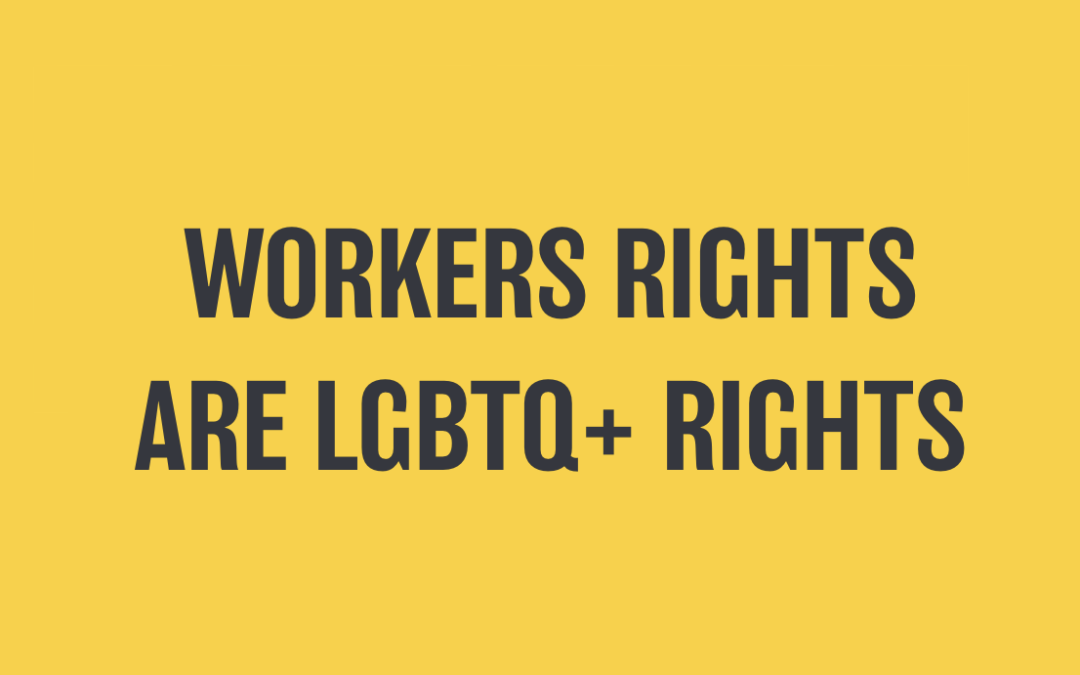14 LGBTQ+ Law Students’ Groups at Top Law Schools Announce That They
Will Refuse to Accept Donations From or Promote Firms That Require
Employees to Sign Away the Right to Sue as a Condition of Employment
Cambridge, MA — LGBTQ+ student organizations from law schools across the country are leading the fight against forced arbitration. 14 organizations from 13 top law schools announced in an open letter today that they will no longer accept any funds from employers that require their employees to sign forced arbitration agreements, nor will they promote these firms to their memberships.
The open letter was jointly written by Harvard Law School Lambda and the People’s Parity Project, a national campaign of law students opposed to forced arbitration. At least four LGBTQ+ law students groups—Harvard Law School Lambda, Michigan OUTLaws, UCLA OUTLaw, and Yale Law School OutLaws—are severing ties with high-profile law firm Gibson Dunn as long as the firm continues to subject employees, such as paralegals and legal secretaries, to forced arbitration agreements.
Currently, 21 states explicitly prohibit anti-LGBTQ+ employment discrimination. But even as LGBTQ+ people have increasingly won rights in the workplace, employers have made it virtually impossible to enforce them. Today, the majority of private-sector, non-union employees are subject to “forced arbitration clauses” buried in the fine print of their employment contracts. These clauses are a legal loophole that forces workers to waive their right to sue over illegal treatment at work. That means that when LGBTQ+ people face discrimination—like the nineteen percent of transgender people who report being discriminated against at work each year—many are legally prohibited from going to court.
LGBTQ+ workers aren’t the only people threatened by forced arbitration: DLA Piper, a global law firm, has come under fire for using forced arbitration to silence allegations of sexual harassment and retaliation in their workplace. Forced arbitration agreements are often paired with non-disclosure agreements that bar workers from speaking out about workplace misconduct.
LGBTQ+ law students informed law firms of their new, anti-arbitration policy on Thursday, October 22. Today, they announced the new policy publicly—and began targeting Gibson Dunn on social media, urging the law firm to change course. Read LGBTQ+ law students’ letter to Gibson Dunn.
“Workplace discrimination remains alive and well in the legal profession—and we cannot in good conscience promote employers as LGBTQ+ friendly when they are using forced arbitraiton to sweep discrimination, harassment, and other workplace misconduct under the rug. The reality is that as long as Gibson Dunn or any other firm subjects its employees to forced arbitration, we simply do not know whether they are safe and equitable workplaces for queer and trans workers,” said Sejal Singh, a founding co-director of the People’s Parity Project and member of Harvard Law School Lambda.
Under pressure from law students, Gibson Dunn has agreed not to require summer associates and first-year associates to sign forced arbitration agreements—but has not committed not to use forced arbitration for non-attorney staff like paralegals. LGBTQ+ law students argue that’s not enough: subjecting non-attorney staff to forced arbitration allows patterns of discrimination to go undetected.
“We are eager to use our platforms to publicly disavow employers whose policies structurally disadvantage the labor force’s most vulnerable employees, including the LGBTQ+ community, people of color, gender non-conforming people, people with disabilities, women, and low-wage workers. That means standing up for all workers in our communities, not just attorneys. Gibson Dunn must drop forced arbitration for everyone,” said Julia Geiger, Co-President of the Yale Law School OutLaws.
Meanwhile, high-profile law firm Williams & Connolly informed law students that it will no longer subject summer associates, associates, or non-attorney staff to forced arbitration. Williams & Connolly is the latest law firm to agree to stop subjecting employees to forced arbitration under pressure from law students against forced arbitration, led by the People’s Parity Project. In the past year, major firms including Kirkland & Ellis and Sidley Austin have stopped requiring employees to sign forced arbitration agreements as a condition of employment.
“Especially as LGBTQ+ workers’ rights are under open attack by the Trump Administration and before the Supreme Court, everyone in the legal profession should be fighting to support their LGBTQ+ employees—not hiding discrimination,” said Matthew Shields, Co-President of Harvard Law School Lambda.
“Forced arbitration clauses muzzle our community from speaking up about the violence visited upon us by those who seek to use and abuse us. We refuse to silence ourselves for the benefit or comfort of our profession, which as been complicit in the degradation of humans through our country’s history,” said Jeremy Penn, President of Georgetown OutLaw. “This petition is small, but it is just one of many bricks, and we do not heave it alone.”
Read LGBTQ law students’ October 22 letter to Gibson Dunn. Since the letter was sent, Cornell Law Lambda has also joined the organizations that have signed on, which include the Queer Caucus at Berkeley Law School, University of Chicago Law School OutLaw, Columbia Law School Outlaws, Georgetown University Law Center OutLaw, Harvard Law School Lambda, Harvard Law School Queer & Trans People of Color, Michigan Law Outlaws, New York University School of Law OUTLaw, Northwestern Pritzker School of Law OUTLaw, Stanford Law School OutLaw, UCLA School of Law OUTLaw, University of Pennsylvania Law School Lambda Law, and Yale Law School OutLaws.
https://peoplesparity.org/wp-content/uploads/2019/11/LGBTQ-Law-Students-Letter-Opposing-Forced-Arbitration_Gibson_Dunn.pdf
Other Resources
- No, Companies That Force Workers to Sign Away Their Right to Sue Are Not LGBTQ-Friendly by Vail Kohnert-Yount, Jared Odessky, and Sejal Singh
- LGBTQ+ Workers Are Winning Their Rights. But Because of Forced Arbitration They Can’t Use Them by Jared Odessky
- Unchecked Corporate Power: Forced Arbitration, the Enforcement Crisis, and How Workers Are Fighting Back by the Center for Popular Democracy and the Economic Policy Institute
